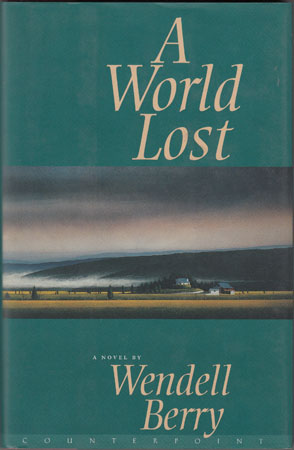A week ago, I closed the slim volume of Wendell Berry’s Port William novel, A World Lost with reluctance. Since Wendell Berry’s books came to my notice twice in the same month a few years back–first through a book review that cited Hannah Coulter as an example of quality literature from a Christian world view, and then through my son who was reading Berry’s agrarian essays–I’ve greeted the end of each novel with the same reluctance.
Berry’s prose is poetic (he’s written several volumes of poetry, too) in the charming manner of southern writer. His characters are finely drawn, deeply flawed and likable, constantly evolving. The town of Port William and the surrounding countryside where the novels take place in the 1920s through the 1950s are whole and real. The setting stirs my earliest memories of visits to my grandparents’ farm at the end of that era. Berry’s ability to authentically communicate his faith without preaching or sanctimony is the lynchpin of his writing. Like Marilyn Robinson in Gilead and Home, Berry’s belief system infuses his writing and characters.
A World Lost is written by Andy Catlett, a Port William native who is revisiting the death of his beloved Uncle Andy for whom he was named. The uncle’s murder occurred fifty years earlier when the narrator was ten and the facts were kept from him. The narrator gently and quietly unearths the truth, and he ends his quest with a description of the Christian’s heaven and hope that brought me to tears.
One by one, the sharers in this mortal damage have born its burden out of the present world…At times perhaps I could wish them merely oblivious, and the whole groaning and travailing world at rest in their oblivion. But how can I deny that in my belief they are risen?
I imagine the dead waking, dazed, into a shadowless light in which they know themselves altogether for the first time. It is a light that is merciless until they can accept its mercy; by it they are at once condemned and redeemed. It is Hell until it is Heaven. Seeing themselves in that light, if they are willing, they see how far they have failed the only justice of loving one another; it punishes them by their own judgment. And yet, in suffering that light’s awful clarity, in seeing themselves within it, they see its forgiveness and its beauty, and are consoled. In it they are loved completely, even as they have been, and are so changed into what they could not have been but what, if they could have imagined it, they would have wished to be.
That light can come into this world only as love, and love can enter only by suffering. Not enough light has ever reached us here among the shadows, and yet I think it has never been entirely absent.
Remembering, I suppose, the best days of my childhood, I used to think I wanted most of all to be happy–by which I meant to be here and to be undistracted. If I were here and undistracted, I thought, I would be home.
But now I have been here a fair amount of time, and slowly I have learned that my true home is not just this place but is also that company of immortals with whom I have lived here day by day. I live in their love, and I know something of the cost. Sometimes in the darkness of my own shadow I know that I could not see at all were it not for this old injury of love and grief, this little flickering lamp that I have watched beside for all these years.
At the end of each Wendell Berry book, I close the cover with reluctance for one over-riding reason. I do not want the little flickering lamp of hope illuminated in his beautiful prose to go out.


